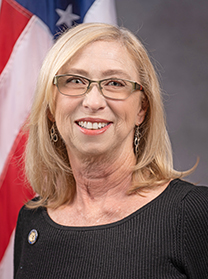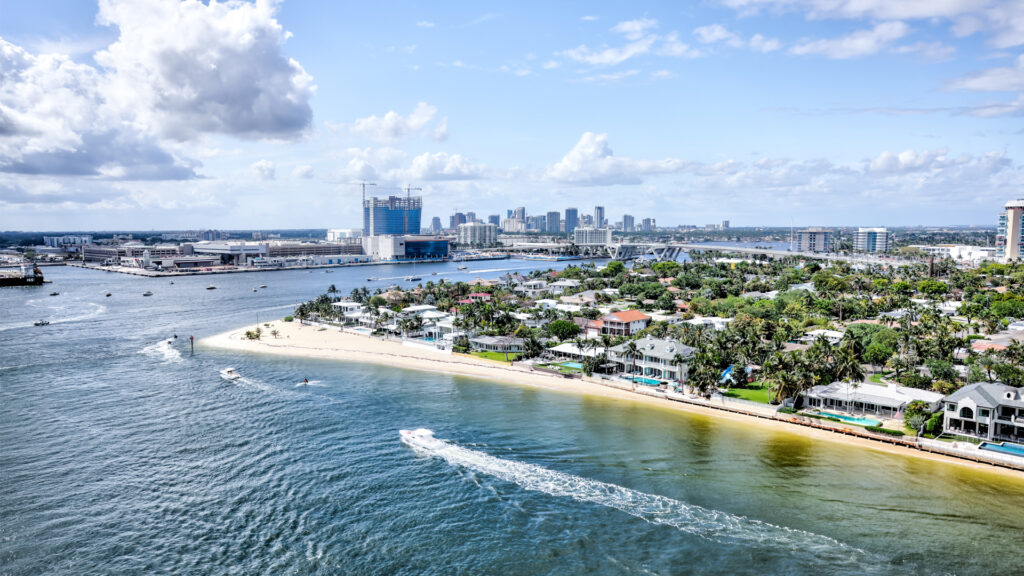By Nathan Crabbe, The Invading Sea
The following Q&A was conducted with Florida state Rep. Kelly Skidmore, D-Boca Raton. Skidmore co-sponsored legislation to create an Office of the Blue Economy in Florida, an idea that was eventually approved under the name the Office of Ocean Economy. This interview has been edited for length and clarity.
Gov. DeSantis recently signed into law a measure establishing the Office of Ocean Economy that’s going to be housed at FAU. Could you tell me a little bit about your efforts to establish such an office and the benefits that you think it will provide the state of Florida?

Sure – I had the opportunity when I was working at the Marine Industries Association of South Florida to start the Marine Research Hub of South Florida. … We were able to create this wonderful collaborative consortium between four universities that had oceanographic institutes; the three county economic development agencies (in) Broward, Palm Beach and Miami-Dade; and the marine industry. …
After a couple of years of getting that established and pulling together a great board, we responded to a request for proposal from an organization called Ocean Exchange, which provided a competitive award process for startup funding. So, we created this pipeline that was academic research (and) economic development startup funding. And that’s something that we recognize as a perfect pipeline for innovation, for solving problems, and it needed to be replicated around the state.
As I got more involved and I was traveling to other places, I realized Florida just didn’t have an office that was connecting all the dots or creating opportunity. … Florida is the most recognizable peninsula in the U.S. We should be ground zero for the blue economy in the United States. Yet organizations around the world … that are also putting an emphasis on the blue economy have no idea that Florida exists.
So that was the motivation for creating the office … Florida really has every kind of water resource, and we should be investing in creating great jobs, good-paying jobs, and improving the economy, but also solving some of the world’s biggest problems. …
Along those same lines, South Florida was designated as a ClimateReady Tech Hub and is seeking additional funding for that effort. How do you see the office and this designation working to promote climate resilience and climate mitigation and adaptation technologies?
Well, I think that the nation is looking at Florida for some answers on climate resiliency – just because of our location, our proximity to the Gulf Stream, the extreme weather that we get. So it’s a natural fit to me, because there are all these other efforts that are happening around the world in terms of the blue economy.
If we can elevate what Florida is doing in that regard – it’s not that Florida is not doing a lot, it’s that no one knows, so venture capital isn’t coming in. … Being able to elevate what we are doing, taking inventories or taking stock of what we’ve got going on and sharing that information, that “rising tide lifts all boats kind of mentality,” that’s what will happen with climate resiliency.
Another piece of legislation that was recently signed into law is HB 1645. It’s gotten a lot of publicity in terms of what it’s done in removing climate change as a priority from state energy policy. What are your thoughts on the impacts of that legislation?
Well, I think that we don’t know. We have done a lot of things that feel like we’re turning the clock back a little whether those are social or environmental or academic. And so there are priorities that that some of us would have that differ from the leadership that we have now. And unfortunately, we have to wait and see what those negative impacts might be.
You previously sponsored a much different energy plan that would have set aggressive goals for reducing greenhouse gas emissions. What would Florida need to do to reduce its greenhouse gas emissions along the lines of what you previously proposed?
I think the very first thing is that the leadership needs to admit that climate change is real – because there is still some reservation or hesitation to say those words out loud, because everyone has decided that it’s a political thing, not a scientific thing. And so we do have to get to that place where it’s a priority for … not just the people in the state, but the people who are making the decisions for the state. …
A lot of times you will see that the Legislature is unresponsive to what the people want, and that’s why we get constitutional amendments … The way that they can make policy changes is through a constitutional amendment… So, the citizens of Florida have these triggers that they can pull or levers that they can pull in order to help change policy, and oftentimes they have to deploy those.

You co-sponsored legislation this session that was aimed at improving climate resilience as well as drinking water standards and coastal water quality. What, specifically, should the state be doing to better address those issues?
I think … FAU did a great study recently on what are the pollutants, what are the contaminants. And everyone has this idea that it’s fertilizer and runoff, and that might be a little bit of it. But really the biggest pollutant is our septic tanks … and spills, just wastewater going into our lakes and rivers and intercoastal waterway because our infrastructure is failing.
Whether it’s 50 million gallons of wastewater in Fort Lauderdale or 100 million gallons of wastewater in Brevard County, that is the biggest problem that I see. That is transformational – to fix that part of the equation, I think, will have dramatic impacts on cleaning up the water.
Another measure that you previously sponsored would have compensated farmers for adopting climate-friendly practices. What kind of practices should agriculture be employing to address climate change and how can government encourage these practices?
Well, to be honest, I find farmers to be incredibly innovative and have a lot of ingenuity. For example, you know the sugar cane growers – they don’t use pesticides. They use owls to keep the rodent population down. What could be better, right? They have out little owl houses … all through their crops that that keep that rodent population down.
Those are the kinds of things that we’re talking about, whether it’s using a part of the land for solar … to create the energy to run water sprinklers using reclaimed water. All of those things are ways in which farmers have and should continue to take advantage of them. (They’re) saving money, potentially reducing the cost of food, and saving the planet.
Is there anything else that we haven’t discussed that you think Florida should make a priority of in terms of either mitigating the impacts of climate change or adapting to them?
Well, I think the (Southeast Florida Regional Climate Compact) has done some great work … You can watch animated videos of what Las Olas Boulevard might look like in 14 years or so, and it’s underwater. It is literally underwater. So we know what is going to happen if we don’t do anything and I do think that universities like FAU – like the ones who are in the Marine Research Hub … they are the hotbed of where the solutions lie. And I think that that just ties right into creating the Office (of Ocean Economy).
It’s really the Office of the Blue Economy – It got renamed over on the Senate side, and for a partisan reason. Hopefully we will get back to calling it the Office of the Blue Economy, because that is something that is recognized globally, that is a name that is recognized globally. So, I think it ties right into our efforts in the blue economy: to solve these really epic problems that not just Florida has, but the rest of the world can learn from us.
Nathan Crabbe is editor of The Invading Sea, which is managed by Florida Atlantic University’s Center for Environmental Studies and receives support from the FAU Charles E. Schmidt College of Science. Sign up for The Invading Sea newsletter by visiting here.



